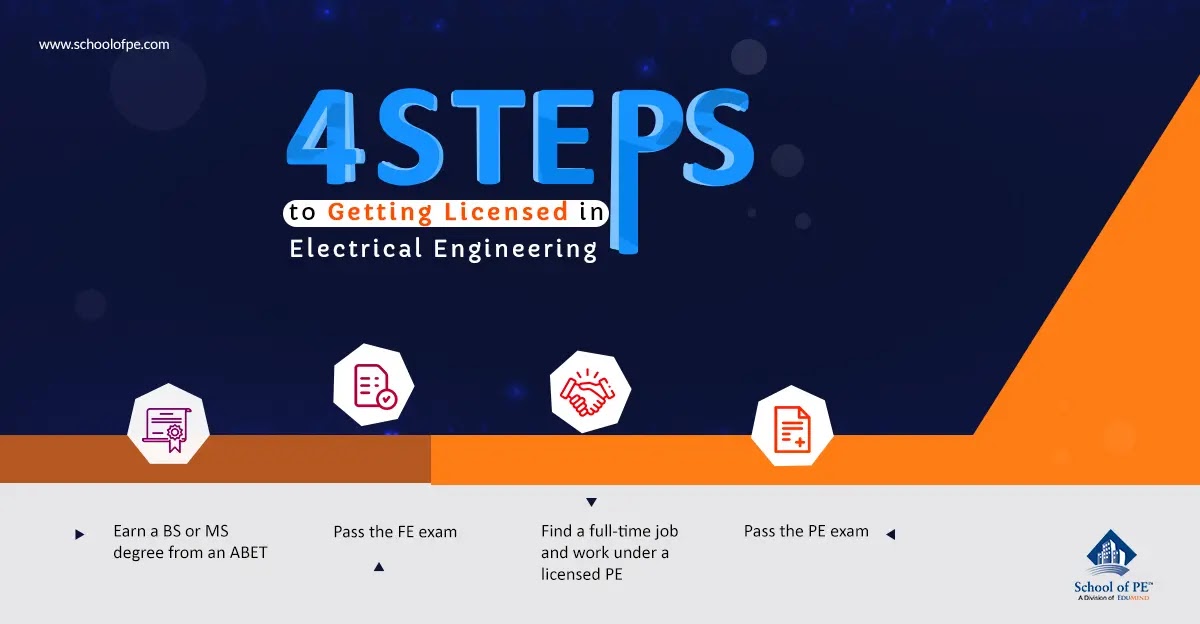4 Steps to Getting Licensed in Electrical Engineering
Earning an electrical engineering license is a huge accomplishment that takes both time and effort. You might be wondering, how does one become a licensed engineer? This process begins with a four-year-long marathon of dedicated effort to graduate with a bachelor's degree, and two more years if someone wishes to continue their education further and pursue a master's degree. Luckily, the effort spent to graduate with a degree kickstarts the process of obtaining your license. I spent time researching and studying how best to accomplish my goal of becoming an electrical engineer, and gleaned several necessary actions to obtain licensure:
Table of Contents
1. Earn a BS or MS degree from an ABET (Accreditation Board for Engineering and Technology)-accredited school program
2. Pass the FE (Fundamentals of Engineering) exam
3. Find a full-time job and work under the supervision of a licensed PE
4. Pass the PE (Principles and Practice of Engineering) exam
2. Pass the FE (Fundamentals of Engineering) exam
3. Find a full-time job and work under the supervision of a licensed PE
4. Pass the PE (Principles and Practice of Engineering) exam
1. Earn a BS or MS degree from an ABET (Accreditation Board for Engineering and Technology)-accredited school program: International students with a degree from a program abroad will need to have their credentials evaluated by the NCEES (National Council of Examiners for Engineering and Surveying) to make sure that their degree meets the requirements set by the ABET. Accredited programs can be found at https://www.abet.org/.
2. Pass the FE (Fundamentals of Engineering) exam: Administered by the NCEES throughout the year, this six-hour exam is a computer-based test focusing on the fundamentals of engineering you learned in your undergraduate program. I recommend taking this exam right after graduation when the content you learned in your classes is still fresh.
3. Find a full-time job and work under the supervision of a licensed PE: Depending on the state, approximately four years of professional experience is required to be able to sit for the PE exam. Some states allow you to sit for the PE exam before the four years of experience have accrued. Individuals whose states employ this policy are still required to obtain the four years of experience before they can apply for their license. Check with your state board to see whether this policy applies.
4. Pass the PE (Principles and Practice of Engineering) exam: Administered by the NCEES throughout the year, this eight-hour, computer-based exam tests the knowledge you have gained working in the industry for four years along with the fundamentals you learned during your undergraduate education.

Once you've passed your PE exam, you are almost done with your journey to achieving your engineering license. You will need to provide evidence to your state board that you met all licensure requirements, including a diploma from an ABET-accredited program and proof that you not only passed the FE and PE exams, but also acquired the four mandatory years of experience as an engineer-in-training (EIT).
I suggest keeping detailed records of your work history as well as maintaining positive relations with your supervisors and coworkers to make procuring their references a simpler process. At the end of this journey, you can proudly call yourself a licensed engineer and begin displaying your competency and skillset. One last quick tip: you will need an electronic or rubber stamp seal to put the finishing touch on your designs!
